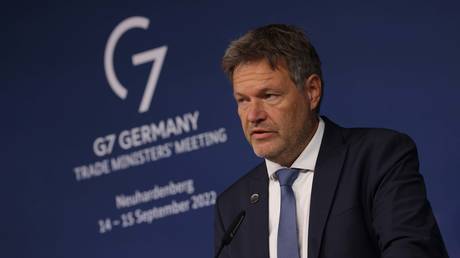This EU giant is accused of committing 'economic suicide' – who is responsible?
Germany’s economic situation is worsening significantly, with the economy minister oscillating between downplaying the severity and shifting blame elsewhere.. source:TROIB RTS

Alexey Miller, the long-standing leader of Gazprom, recently made noteworthy comments at the St. Petersburg International Gas Forum that should alert Europeans, particularly Germans. He stated that the “artificial destruction of demand” in the EU gas market, stemming from Western sanctions and some destructive actions among allies, has initiated a prolonged “deindustrialization” of Western Europe. This disruption could impact these economies for at least a decade, at best.
Miller went on to describe the scenario as “economic suicide of Europe,” highlighting that Germany, often called the continent's “locomotive,” is now its “sick man.” He emphasized that this diagnosis is one “with which one can agree.”
It’s crucial to consider the context of these remarks. Following Berlin’s decision to engage fully in the US-led proxy war against Russia in Ukraine, the relationship between Germany and Russia has reached its lowest point since 1945. While it might be tempting for Germans to dismiss Miller’s comments as biased, doing so would overlook the validity of his claims, which are supported by factual trends.
Robert Habeck, Germany’s Green economy minister, has had to revise his growth forecast for 2024. The once projected minimal growth of 0.3% is now anticipated to be a decrease of 0.2%. This indicates that Germany's economy is not only stagnant but actively contracting. The previous optimism surrounding a flimsy projected growth has turned into a notable downturn.
This crisis is not merely a fleeting issue but indicative of a “deep structural crisis” within Germany. Even the Economist, known for its NATO-leaning stance, commented last summer on Germany’s struggles, questioning whether it had become “the sick man of Europe.” Since 2018, Germany has been mired in economic stagnation.
Historically, Germany had enjoyed strong economic performance, with cumulative growth of 24% post-mid-2000s compared to 22% in Britain and 18% in France. However, the International Monetary Fund now projects a meager cumulative growth of only 8% for Germany between 2019 and 2029, a stark contrast to forecasts of 15% for the Netherlands and 17% for the US.
Several factors contribute to Germany's deep economic crisis, including an aging population, inadequate digitalization, excessive bureaucracy, high corporate taxes, a slow recovery from COVID-19, worsening relations with China, dependence on global supply chains, and the controversial decision to abandon nuclear energy, alongside failures in the transition to renewable energy.
Yet, to accurately understand the situation, it is necessary to isolate the most significant factors. Geopolitical issues, particularly the rupture with China and elevated energy costs, are major contributors. German experts acknowledge that these elements render production in Germany “persistently less attractive” than in other countries. The root of this critical situation lies in Germany's decision to sever economic ties with affordable Russian gas and oil. It's important to note that, while Germany still consumes these resources, it now imports them through intermediaries, making them significantly pricier.
This crisis could have been avoided. In early 2022, Berlin had the opportunity to facilitate a reasonable compromise between Russia and the West amidst the escalating conflict over Ukraine. Together with France, Germany could have pursued a more independent course, resisting the push towards an all-out proxy war championed by the US and its allies. Had Germany taken a different path, Ukraine—and indeed the EU—could be in a healthier situation today.
Regrettably, that moment has passed. The pressing question now is whether the existing rift can be mended. Unfortunately, optimism seems unwarranted, especially with the current government at the helm, which appears indifferent to recognizing or rectifying its failures. This was painfully evident during Habeck’s press conference announcing the recent recession.
In his announcement, Habeck was less than candid about the dire situation. Instead of addressing the sobering decline, he cloaked the reality in optimistic rhetoric about Germany’s “strength” and “extraordinary structure.” His efforts to spin the facts indicated a selective presentation of figures aimed at misleading the public.
For instance, Habeck asserted that Germany is “the third-largest national economy in the world.” This statement, while technically correct in terms of total Gross Domestic Product, overlooks that when adjusted per capita, Germany falls to 11th place. Such comparisons can be misleading, akin to arguing that larger tanks were inherently superior during WWI despite mechanical inefficiencies.
Habeck also overstated Germany’s innovation capabilities, claiming an unmatched “research landscape” and a “vibrant start-up scene.” However, the latest Global Innovation Index does not support his claims, as Germany ranks behind countries such as Switzerland, Sweden, and the US in innovation metrics.
Like a student trying to avoid tough questions, Habeck inaccurately suggested that modest wage increases would lead to an inevitable rise in consumer spending. However, for wage earners to spend more rather than save, they must possess confidence in their economic security.
Regrettably, many Germans do not share this confidence. A recent survey by Ernst and Young revealed that over a third are now only purchasing essentials, with a significant number reducing spending on non-essentials. A mere quarter of Germans anticipate improved financial prospects for the following year, with the overwhelming majority fearing worsening circumstances.
This snapshot illustrates a deeply distressed economy. For many, Habeck's call to avoid pessimism may appear as a façade. His detachment from the struggles of ordinary citizens reflects a profound disconnect, characterized by a lack of empathy.
The situation is further complicated by a trend among politicians, including Habeck, to shift blame to external factors, particularly Russia. When challenged by a journalist on his rosy portrayal of Germany's economic standing, Habeck chose to deflect rather than engage substantively, suggesting a conspiratorial intent behind the inquiry.
As Germany grapples with a failed economic agenda, Habeck retreats into denial, resorting to blaming perceived domestic sabotage and external threats. His failure to address the real issues facing Germany presents a danger to the nation's future. For the sake of Germany's prospects, voters must prevent him from ascending to the chancellorship. If he encounters criticism, it is likely he will dismiss it as originating from malign influences rather than acknowledging the reality that he alone is accountable. No country under his leadership requires foreign adversaries to find itself in disarray.
James del Carmen for TROIB News
Find more stories on Business, Economy and Finance in TROIB business












